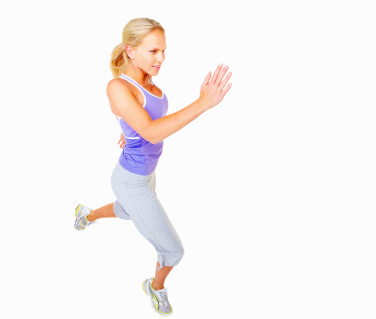Water Retention after a Long Run
by Misty
(Saskatoon, Saskatchewan)

I use gels, and electrolyte replacement drinks during the race and drink lots of water, it also does not matter if it is a cool or hot day, happens to me regardless of weather.
What could be causing this?
It does not happen to me on shorter runs; in fact I lose water and am lighter after a short run. I just ran a half on Sunday and today is Wednesday and I am just finally getting back to normal.
Answer by Dominique:
Thanks for your question regarding water retention after your long runs and races. I have not experienced it personally. However, I have friends who it has happened to. It has always been temporary and not a massive cause of concern. I will walk you through:
1. Reasons you could be experiencing water retention during your running
2. Things to experiment with to avoid water retention
Reasons You Could Be Experiencing Water Retention During Your Running

Here are some alternative explanations for bloating and water retention after a running race:
Dehydration: Although it may seem counterintuitive, dehydration can actually cause water retention in your body. When your body is dehydrated, it holds on to water to maintain hydration levels, which can lead to bloating and water retention.
Electrolyte Imbalance: When you sweat during exercise, you lose electrolytes like sodium, potassium, and magnesium, which are essential for proper fluid balance in your body. If you don't replenish these electrolytes after the race, it can lead to fluid imbalances and bloating.
Inflammation: Intense exercise, like running a race, can cause inflammation in your body. This inflammation can cause fluid to accumulate in tissues, leading to bloating and water retention.
Post-Race Nutrition: What you eat after a race can also contribute to bloating and water retention. If you consume foods that are high in sodium or other inflammatory ingredients, it can cause your body to retain water and lead to bloating.
Hormones: Hormonal changes during menstruation or menopause can also cause bloating and water retention in your body, regardless of exercise. Running a race can exacerbate these hormonal changes, leading to more noticeable bloating and water retention.
Things to Experiment With to Avoid Water Retention

Hydrate properly: Drinking enough water before, during, and after the race is crucial for preventing dehydration, which can lead to water retention. Aim to drink at least 8-10 glasses of water per day, and more if you are participating in a strenuous activity like a running race.
Limit your salt intake: Consuming too much salt can lead to water retention and bloating. Try to avoid processed foods, which often contain high amounts of sodium, and opt for fresh fruits, vegetables, and lean proteins instead.
Stretch: After the race, be sure to stretch out your muscles to help prevent fluid buildup. Stretching can also help reduce inflammation and soreness. Check out my page on running stretches for more info.
Elevate your legs: Elevating your legs can help reduce swelling and fluid buildup. Lie on your back and prop your legs up on a pillow or cushion.
By the way, this a massive tip for dealing with muscle soreness after a race as well. I try to do it after every race; it really helps with getting rid of some of the toxins. Professional football players swear by it!
Wear compression gear: Compression socks or tights can help improve circulation and prevent fluid buildup in the legs.
Remember, it is not a cause of massive concern to experience some water retention and bloating after a running race, but these tips can help minimize the effects and help you recover faster. If you have concerns about persistent bloating or swelling, you should speak with a healthcare professional.
Hope that helps.
Kind regards,
Dominique
What's New?
-
In the Army - Improving my 2 Mile Time
I am a 36 year old male who just joined the army. I have not run any long distance so I tried on my own to train and was doing ok but my times are still -
Marathon Diet - Improve Nutrition to do Better at the Marathon
I have got a question about my marathon diet. I have been an athlete all my life; mostly a runner, but cycle long distances sometimes. I am training -
Beginners Running Program 3 - Go from 0 to 30 Minutes of Running in 12 Weeks
The third beginners running program of Best Running Tips might be the best one. It is definitely the most popular. Get from couch to 30 minutes of solid running in only 12 weeks! -
Calories Burned Calculator - Calculate the Calories Burned While Running with This Calculator
This calories burned calculator calculates the calories burned while running, based on your weight and the distance you ran. -
Asthmatic Non-Runner With a Need to Run - 1.5 Miles in 13 Minutes
Truth be told I am NOT a runner. I can walk a 14 minute mile all day. But running, not me. I have had asthma since I was a child - severe through all -
Second Half Marathon in a Month - Should I Run It or Not?
Hi, I ran a half marathon a month ago, but have not done any great distances since, 6 miles max. I'm thinking of doing a half marathon this Sunday -
Running a 5k - Can I Be Faster at 30 Than I Was at 18?
I started running at 13 in high school. I ran cross-country, indoor and outdoor track. My track coach was very informed and my PRs were 800 - 2:22, -
Faster Minute Mile for 5K races
I'm 40 years old and I started to run consistently four months ego. My running pace went from 9 minutes miles to 7:30 minute miles in a 5k. Is it realistic -
I Need a Good Marathon Running Program
I am devastated. I ran my second marathon last weekend. I ran a marathon six months ago as well, but at about the 19-20 mile mark my legs cramped up... -
Is 20 to 30 Training Miles Enough to Run a Half Marathon
I have been a committed runner for a year and a half now and have completed two half marathons with over a dozen 10k races! I have been keeping running



